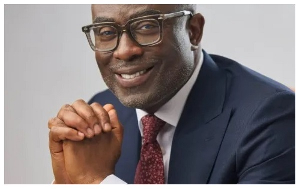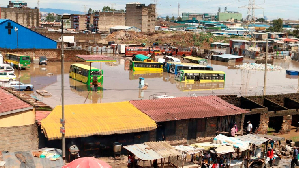Regional News of Tuesday, 16 September 2008
Source: Ghanaian Chronicle
Asantehene Woos Indian, Congolese Investors
The Asantehene, Otumfuo Osei Tutu II, has advocated a closer business relationship between the Indian business communities, and their counterparts in Ghana.
He has therefore appealed to the India High Commissioner to Ghana, Mrs. Ruchi Ghanashyam, to use her good office to help establish Technical and Vocational training institutions in the country, to provide entrepreneurial skills for the youth in Ghana.
Oumfuo Osei Tutu, who made the call when Mrs. Ruchi Ghanashyam, called on him at the Manhyia Palace, noted that Ghana, as a developing country, needed a lot of middle level manpower to push the economy, and since India was well versed in technical and vocational education, their presence in the country would be very beneficial.
He expressed gratitude to the Indian government, for offering a number of scholarship schemes, which had enabled Ghanaian students to study in various institutions in India, and appealed for increase in the number, to give the youth in Ghana more opportunities to study in India.
The Asantehene recalled how in the past, private businessmen came to the country to establish private businesses, which offered employment to the youth, adding "they contributed immensely to the building of Ghana's economy, through the private sector."
He stated that Ghana had a lot to learn from her counterparts in Asia, under the South-South Co-operation, stressing that India and China were shining examples to the rest of Africa.
The Asantehene, therefore, prayed for peaceful co-existence between India and her neighbour, Pakistan, in the midst of political instability that had bedevilled the latter.
Mrs. Ghanashyam, on her part, said following the good relationship between India and Ghana, trade between the two countries had doubled.
She mentioned a number of projects including the establishment of the Kofi Annan ICT Training Centre, Agro Processing companies, and the construction of the Presidential Complex in Accra, as India's contribution towards the development of the Ghanaian economy, in recent times.
She disclosed that the government of India had instituted some short courses in Agriculture, ICT and other Science-related studies, which would soon be made available to interested Ghanaian students wishing to take part in the various disciplines.
The High Commissioner was accompanied to the Manhyia Palace by her husband, Mr. A.R Ghanashyam, who is also the Indian Ambassador to Angola.
In a related development, the Asantehene has expressed his appreciation, to the government of the Democratic Republic of Congo, for establishing a consulate section in Kumasi, to enable businessmen who want to deal with that country, have easy access to figures and information concerning the Central African country.
The Asantehene noted that DR Congo was endowed with huge mineral resources, which were yet to be tapped, and hoped that expertise in Ghana would be utilised in that direction.
The occasion was when Mr. Ngeleka Dimata, Honorary Consulate of the DR Congo in Kumasi, paid a courtesy call on the Ashanti King at the Manhyia Palace, to officially introduce himself.
The Asantehene traced the history of the good relationship between Ghana and DR Congo, dating back to the early days of Ghana's independence, and the assistance Ghana offered to that country, through the then President, Dr. Kwame Nkrumah.
He described the President of DR Congo, Mr. Joseph Kabila, as a humble man, who had worked hard to ensure the sustenance of democracy in that country.
Mr. Dimata expressed his country's gratitude to Ghana, for assistance in the area of trade, commerce, and the maintenance of peace.
He stated that there were now 500 Ghanaian troops serving under the United Nations Peacekeeping mission in DR.Congo, and hoped that through their efforts, his country would remain peaceful.
He disclosed that some Congolese businessmen had established a company in Kumasi, which would deal with the assembling and exporting of computers to neighbouring countries in West Africa.
Opinions









